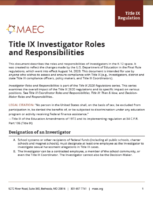
Download: MAEC_TitleIX_Investigators_091720
This document describes the roles and responsibilities of Investigators in the K-12 space. It was created to reflect the changes made by the U.S. Department of Education in the Final Rule regulations, which went into effect August 14, 2020. This document is intended for use by anyone who wishes to assess and ensure compliance with Title IX (e.g., Investigators, district and state Title IX compliance officers, policy makers, and Title IX Coordinators).
Investigator Roles and Responsibilities is part of the Title IX 2020 Regulations series. This series examines the overall impact of the Title IX 2020 regulations and its specific impact on various positions. See:
- Title IX Coordinator Roles and Responsibilities,
- Title IX then and Now for K-12- What has Changed?,
- Title IX Decision-Maker Roles and Responsibilities,
- and Title IX Grievance Procedure.
Investigator Roles and Responsibilities
LEGAL CITATION: “No person in the United States shall, on the basis of sex, be excluded from participation in, be denied the benefits of, or be subjected to discrimination under any education program or activity receiving Federal finance assistance.”
—Title IX of the Education Amendments of 1972 and its implementing regulation at 34 C.F.R. Part 106 (Title IX)
Designation of an Investigator
A. School systems or other recipients of federal funds (including all public schools, charter schools and magnet schools), must designate at least one employee as the investigator to investigate sexual harassment allegations in Title IX cases.
B. The investigator can be a contracted employee, a member of the school community, or even the Title IX Coordinator. The Investigator cannot also be the Decision-Maker.
Core Responsibilities of the Investigator
The Investigator bears the burden of gathering evidence in order to (1) determine if the sexual harassment allegations meet Title IX standards, and (2) provide the Decision-Maker with evidence with which to base the written determination of responsibility at the end of the
grievance procedure. The Investigator is responsible for conducting interviews with all parties and witnesses, sharing investigative evidence with all parties for their review, and writing the investigative report. The investigative report cannot recommend a determination for the
Decision-Maker. The Investigator cannot have a conflict of interest with, or bias for or against any member in the proceedings.
Mandatory Training
School districts need to ensure that they train the Decision-Maker, Investigator, and Title IX Coordinator in preparation for their roles in the Title IX grievance procedure. This training must include the following:
- the definition of sexual harassment the scope of the school’s education program or activity
- how to conduct an investigation and grievance process (including hearings, appeals, and informal resolution processes)
- how to serve impartially (including by avoiding prejudgment of the facts at issue, conflicts of interest, and bias)
The Investigator needs to receive one additional piece of training:
- issues of relevance to create an investigative report that fairly summarizes relevant evidence
Before the Investigation
The investigation cannot begin until both the complainant and the respondent receive a Notice of Investigation/Allegation (NOIA). The NOIA must include the following information:
- details of the allegations including identities of the parties involved, date(s) of the incident(s), location(s) of the incident(s), the conduct that would be considered sexual harassment, the specific section(s) of the policy alleged to have been violated
- a statement that the respondent is presumed “not responsible” for the conduct until the Decision-Maker makes a determination
- a statement that all parties are allowed to have an advisor
Remember, throughout the investigation, the Investigator must presume innocence of all parties. If during the investigation, additional allegations arise between the complainant and the respondent, the Investigator will need to provide another NOIA to the involved parties.
Investigation of a Formal Complaint
The Investigator may wish to coincide the NOIA with the written notice to the parties of their upcoming interviews. Written notice should include the date, time, location, participants, and purpose of all interviews. This written notice should be sent far enough in advance so that the parties have ample time to prepare for the interview.
Throughout the investigative process, the Investigator should ensure that parties have equal opportunities at every step to
- inspect and review evidence,
- invite their respective advisors to the interviews,
- and present witnesses and evidence.
Before the Investigator writes the investigative report, they must send all evidence in a digital or hard-copy format to each party and the party’s advisor. All parties will have at least 10 days to submit a written response to the evidence.
After the 10 days, the Investigator must create an investigative report to summarize relevant evidence and review the investigation stage, taking into consideration each party’s responses.
This report must present evidence without any recommendation for the Decision-Maker. The investigative report should include the following:
- identification of the grievance procedure steps taken
- description of witnesses interviewed and their final statements
- corroborative and contradictory evidence, as well as documentation of evidence
- summary, including the findings
This report must be sent, in a digital or hard-copy format and at least 10 days before a hearing or whenever the Decision-Maker will review the evidence, to each party and their advisors for their review and written response. The Decision-Maker will use the investigative report to
determine responsibility of the respondent.
Adapted from the U.S. Department of Education Title IX Final Rule regulations.

